

Aspergers makes me far too complex to be put into words for NS people
Late Middle Ages and Renaissance (14th century to 1559) Manuscripta Mediaevalia. Resources for Medieval Studies. NetSERF. Pope Alexander VI. Pope Alexander VI, born Roderic Llançol i de Borja (Catalan pronunciation: [roðeˈɾiɡ ʎanˈsɔɫ i ðe ˈβɔɾdʒa], Spanish: Rodrigo Lanzol y de Borja [roˈðɾiɣo lanˈθol i ðe ˈβorxa]; 1 January 1431 – 18 August 1503) was Pope from 11 August 1492 to his death on 18 August 1503.
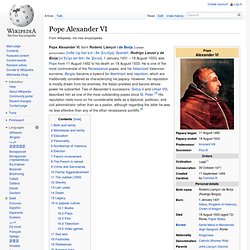
He is one of the most controversial of the Renaissance popes, and his Italianized Valencian surname, Borgia, became a byword for libertinism and nepotism, which are traditionally considered as characterizing his papacy. However, his reputation is mostly drawn from his enemies, the Italian prelates and barons whose power he subverted. Two of Alexander's successors, Sixtus V and Urban VIII, described him as one of the most outstanding popes since St. Peter.[3] His reputation rests more on his considerable skills as a diplomat, politician, and civil administrator rather than as a pastor, although regarding the latter he was no less effective than any of the other renaissance pontiffs.[4] Birth and family[edit]
The Death of Alexander VI, 1503. Pope Alexander VI. Background Born Roderic de Borja to Cardinal Alfonso de Borja into an ancient family in Xàtiva, València, today Spain but at then Kingdom of Valencia under the Crown of Aragon.
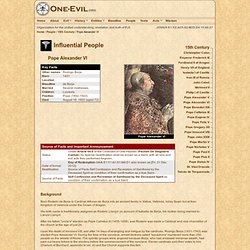
His birth name is traditionally assigned as Roderic Llançol on account of Isabella de Borja, his mother being married to Lanzol Llançol. Cliojournal.wikispaces. Cesare Borgia. Cesare Borgia (Italian pronunciation: [ˈtʃɛzare ˈbɔrdʒa]; Valencian: Cèsar Borja, [ˈsɛzər ˈβɔrʒə]; Spanish: César Borja, [ˈθesar ˈβorxa]; 13 September 1475 or April 1476[1] – 12 March 1507), Duke of Valentinois,[2] was an Italian[3][4][5] condottiero, nobleman, politician, and cardinal.
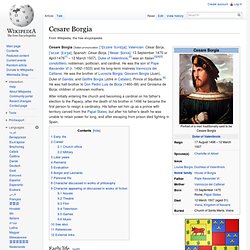
He was the son of Pope Alexander VI (r. 1492–1503) and his long-term mistress Vannozza dei Cattanei. Banquet of Chestnuts. The Banquet of Chestnuts, known more properly as the Ballet of Chestnuts, refers to a fête in Rome, and particularly to a supper held in the Papal Palace by Cardinal Cesare Borgia, son of Pope Alexander VI on 30 October 1501.
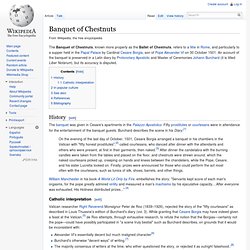
An account of the banquet is preserved in a Latin diary by Protonotary Apostolic and Master of Ceremonies Johann Burchard (it is titled Liber Notarum), but its accuracy is disputed. History[edit] The banquet was given in Cesare's apartments in the Palazzo Apostolico. Fifty prostitutes or courtesans were in attendance for the entertainment of the banquet guests. Lucrezia Borgia. Lucrezia's family later came to epitomize the ruthless Machiavellian politics and sexual corruption characteristic of the Renaissance Papacy.
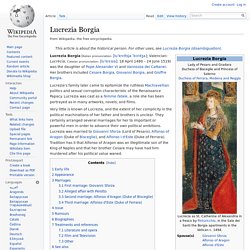
Lucrezia was cast as a femme fatale, a role she has been portrayed as in many artworks, novels, and films. Very little is known of Lucrezia, and the extent of her complicity in the political machinations of her father and brothers is unclear. They certainly arranged several marriages for her to important or powerful men in order to advance their own political ambitions. Letter to lucrezia. Letter to lucrezia. Letter to lucrezia. ORB: The Online Reference Book for Medieval Studies. Natureofhistory. King Henry VIII and the Vatican. This poll was another Church history quiz.

In the 16th century, King Henry VIII broke with the Roman Catholic Church, making the English church independent. What were his reasons for doing so? Check as many as apply. 92% of you knew about the divorce. It is true that he wanted a divorce, and the pope wouldn’t give him one. 14% of you knew about Spain’s invasion plans. Tudors - Catherine of Aragon Timeline. Catherine of Aragon. Henry VIII and Foreign Policy. Henry VIII’s foreign policy primarily involved France and the Habsburg Empire.
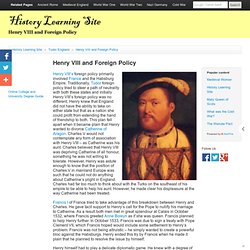
Traditionally, Tudor foreign policy tried to steer a path of neutrality with both these states and initially Henry VIII’s foreign policy was no different. Henry knew that England did not have the ability to take on either state but that as a nation she could profit from extending the hand of friendship to both. Vatican exhibition: The threatening letter sent to a Pope 'asking' him to annul Henry VIII's first marriage. 1530 letter is one of 100 documents on display as Vatican exhibits materials from secret archive for the first time By Graham Smith and Nick Pisa Updated: 12:19 GMT, 1 March 2012 Threatening: Released from the Vatican archives for the first time, this 1530 letter - a 3ft-wide parchment with 81 wax seals attached to red silk ribbons - sent by English noblemen urged Pope Clement VII to annul Henry VIII's marriage to his first wife so the king could marry Anne Boleyn A group of English noblemen threatened the Roman Catholic Church when they wrote to the Pope urging him to annul Henry VIII's marriage to his first wife so the king could marry Anne Boleyn, a letter released by the Vatican has revealed.
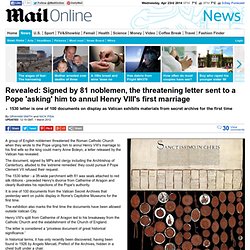
The document, signed by MPs and clergy including the Archbishop of Canterbury, alluded to the 'extreme remedies' they could pursue if Pope Clement VII refused their request. The exhibition also marks the first time the documents have been allowed outside Vatican City. Scroll down for video. The diary of John Burchard of Strasburg : bishop of Orta and Cività Castellana ... A.D. 1483-1506 : Burchard, Johann, d. 1506. Coat of arms johannes burchard. Diarium: 1492-1499 - Johann Burchard. Johann Burchard. Johann Burchard, also spelled Johannes Burchart (c.1450–1506) was an Alsatian-born priest and chronicler during the Italian Renaissance.
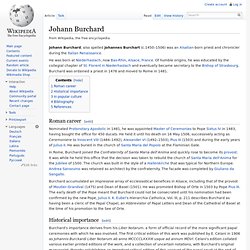
He was born at Niederhaslach, now Bas-Rhin, Alsace, France. Of humble origins, he was educated by the collegial chapter of St. Florent in Niederhaslach and eventually became secretary to the Bishop of Strasbourg. Burchard was ordained a priest in 1476 and moved to Rome in 1481. Roman career[edit] Nominated Protonotary Apostolic in 1481, he was appointed Master of Ceremonies to Pope Sixtus IV in 1483, having bought the office for 450 ducats.